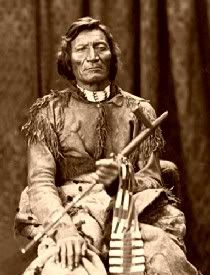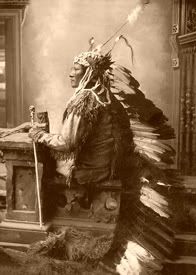|
-
2nd June 10, 04:36 PM
#41
 Originally Posted by ThistleDown

Brian, may I tap your knowledge as a re-enactor? What caused the aboriginal of the American prairies to, within the last forty years of the 19C and the first ten or so of the 20C, completely change his manner of dress? Paintings and photographs of the period show him something like this one of Cheyenne Dull Knife in 1873.

Or this one of Sioux Rain-in-the-Face, he who was at the Battle of Bighorn

I'm not trying to sidetrack us here, but trying to draw some sort of parallel that may be more easily understood.
Rex
The dominant society killed off all the buffalo, which the plains Tribes used to make just about everything they needed.
By Choice, not by Birth
-
-
2nd June 10, 05:11 PM
#42
 Originally Posted by Bigkahuna

The dominant society killed off all the buffalo, which the plains Tribes used to make just about everything they needed.
The reasons for such sudden changes to native society are a bit more complicated than just this one issue, I would think, but certainly the loss of raw material for clothing (and food and shelter) must have contributed.
Rex
-
-
3rd June 10, 05:55 AM
#43
 Originally Posted by ThistleDown

The reasons for such sudden changes to native society are a bit more complicated than just this one issue, I would think, but certainly the loss of raw material for clothing (and food and shelter) must have contributed.
Rex
+10 for observation, Rex. The destruction of the Buffalo/Bison certainly was a major factor in the destruction of the First Nations, but there were many other factors, including the very tribal nature of their society, which prevented a political/military alliance.
T.
-
-
4th June 10, 11:54 AM
#44
The Sewing Machine was invented in the mid 18th century and was more or less perfected by the middle of the 19th. As has been discussed elsewhere, trousers can be made easily with a sewing machine, but a Kilt requires more hand work, presumably even if the same fabric is used... I agree, there are many factors at work, certainly including a taste for "modern" ways, a desire to appear less rustic, etc. I would imagine many kilts were worn well past the lives of their original owners, but they do wear out eventually- and a worn out kilt could be reworked into a pair of trousers, couldn't it? And some careful thinker might be able to address the causes and effects of underwear in this evolutionary process... Finely knitted drawers and union suits? Comfortable cotton shorts to protect the wearer AND his woolen trousers?
Some take the high road and some take the low road. Who's in the gutter? MacLowlife
-
-
4th June 10, 06:34 PM
#45
 Originally Posted by MacLowlife

The Sewing Machine was invented in the mid 18th century and was more or less perfected by the middle of the 19th. As has been discussed elsewhere, trousers can be made easily with a sewing machine, but a Kilt requires more hand work, presumably even if the same fabric is used... I agree, there are many factors at work, certainly including a taste for "modern" ways, a desire to appear less rustic, etc. I would imagine many kilts were worn well past the lives of their original owners, but they do wear out eventually- and a worn out kilt could be reworked into a pair of trousers, couldn't it? And some careful thinker might be able to address the causes and effects of underwear in this evolutionary process... Finely knitted drawers and union suits? Comfortable cotton shorts to protect the wearer AND his woolen trousers?
I agree 100% with trowsers (19th century american spelling) being easily, and readily machine sewn by the mid century, with minimal hand work required. I have a question though, and not to bring us off topic, but for the sake of comparison. In the mid 1800s labor in the US was cheap, but materials were extremely expensive. Some manufacturers, such as the US government (arsenal/depot system) were slow to switch to machine sewn products, since the labor was cheap, and workers were readily available. Could this have been a similar situation in the highlands? Could labor have been cheap, but materials expensive? This might explain the transition to trowsers, as they require less material, and even if completely hand sewn, the labor pool was so cheap, that material was the driving force behind the transition. I am thoroughly enjoying reading this thread.
-
-
5th June 10, 06:12 AM
#46
I think many, if not most of us, can appreciate the idea of having more time than money. Particularly in the mid-20th century, many people of some means still sewed or grew vegetables, or otherwise did for themselves what they couldn't afford (or didn't want) to pay others to do. At the same time, it doesn't take much imagination to see that some people have ready access to materials they'd rather sell than keep for themselves, lobsters being one example, but more obviously gold and gemstones.
I think the ability to sell one's goods to people far away certainly affects the decision of what to keep and what to sell and I think possessing skills affects the choice between making your own and buying somebody else's goods. Getting out of the habit of making your own is the first step towards buying what the man has to sell you.
I wish I had some historical data to back this up. I, too have greatly enjoyed this thread.
Some take the high road and some take the low road. Who's in the gutter? MacLowlife
-
-
6th June 10, 11:25 PM
#47
 Originally Posted by MacLowlife

The Sewing Machine was invented in the mid 18th century and was more or less perfected by the middle of the 19th. As has been discussed elsewhere, trousers can be made easily with a sewing machine, but a Kilt requires more hand work, presumably even if the same fabric is used... I agree, there are many factors at work, certainly including a taste for "modern" ways, a desire to appear less rustic, etc. I would imagine many kilts were worn well past the lives of their original owners, but they do wear out eventually- and a worn out kilt could be reworked into a pair of trousers, couldn't it? And some careful thinker might be able to address the causes and effects of underwear in this evolutionary process... Finely knitted drawers and union suits? Comfortable cotton shorts to protect the wearer AND his woolen trousers?
Sorry for the absence from this discussion. I've been away fishing (caught a lovely 10+ Rainbow out of the water its own length and more  ). MLL I certainly understand your argument for the sewing machine having an impact on 18-19C society in America, but not in the Highlands of Scotland, I'm afraid. ). MLL I certainly understand your argument for the sewing machine having an impact on 18-19C society in America, but not in the Highlands of Scotland, I'm afraid.
You just do not understand the nature of our society in those years. Abject poverty was the way of life for the common folk in the Highlands. They grubbed in the soil, they cherished their few livestock, they planted their potatoes and, perhaps, their peck of oats. They slaved at cutting their peats and drying them in our sopping climate. They kept their livestock indoors with them in the winter months to provide heat for all creatures. If the harvest had been bad they bled the cows almost but not yet to the death for the protein and only when the chickens stopped contributing their eggs did they have any other meat.
The salmon of the loch and the deer of the hill belonged to the new owners of the land and the penalties for taking those without permission was removal. Steal a fish or poach a hind and you are out on your ear.
Can you imagine in any way that these folk could go off to the shop and buy themselves a Singer?
You are attempting to view the Highlands from an entirely mythical perspective. "A taste for modern ways"? What are those to a folk who can just barely live the winter through in their tatters of clothing? Jock's story of the lads crying to anger at viewing the drawings of Landseer and the others has naught to do with the dress of the characters, but all to do with the sheer nastiness of the artist and his "selling" of his product on the backs of the poor of the land.
Rex
-
-
7th June 10, 12:37 AM
#48
Sorry to go off topic for a moment
ThistleDown can you please take your trout over to the current food thread and tell us how did or will prepare it for consumption, many thanks
Please resume original topic Sorry for the highjack
-
-
7th June 10, 08:01 PM
#49
I recently finished Samuel Johnson's travelogue of Scotland in 1773
While he commends the Highlanders for their hospitality and a general lively spirit, he continually comments on their poverty and lack of modern amenities.
He only mentions kilts three times, but has this to say about the kilt while on the Island of Sky.
“In the islands the plaid is rarely worn. The law by which the Highlanders have been obliged to change the form of their dress, has, in all the places that we have visited, been universally obeyed. I have seen only one gentleman completely clothed in the ancient habit, and by him it was worn only occasionally and wantonly. The common people do not think themselves under any legal necessity of having coats; for they say that the law against plaids was made by Lord Hardwicke, and was in force only for his life: but the same poverty that made it then difficult for them to change their clothing, hinders them now from changing it again.
The fillibeg, or lower garment, is still very common, and the bonnet almost universal; but their attire is such as produces, in a sufficient degree, the effect intended by the law, of abolishing the dissimilitude of appearance between the Highlanders and the other inhabitants of Britain...”
My take on this passage is that when a highland man is concerned with putting food on the table, he is not concerned about whether he is wearing a kilt or britches.
-
-
11th June 10, 07:39 AM
#50
The Singer company used to sell its machines on hire purchase terms - could it be that the distances between settlements and 'civilisation' in the Highlands prevented this, as it would be uneconomical for someone to go and collect a few pennies each week from an isolated hamlet?
My father's mother bought a Singer sewing machine at six pence a week when living in a village in Derbyshire in the 1920's. I believe that the collector came on his bicycle from the nearest railway station.
Anne the Pleater :ootd:
-
Similar Threads
-
By Paul in forum General Kilt Talk
Replies: 26
Last Post: 27th November 09, 08:35 PM
-
By Phogfan86 in forum General Kilt Talk
Replies: 6
Last Post: 6th April 09, 09:56 AM
-
By Hamish in forum Contemporary Kilt Wear
Replies: 27
Last Post: 24th February 09, 07:27 PM
-
By Cayusedriver in forum General Kilt Talk
Replies: 3
Last Post: 22nd August 08, 11:14 AM
-
By S.G. in forum General Kilt Talk
Replies: 17
Last Post: 30th July 08, 03:21 PM
 Posting Permissions
Posting Permissions
- You may not post new threads
- You may not post replies
- You may not post attachments
- You may not edit your posts
-
Forum Rules
|
|
Bookmarks